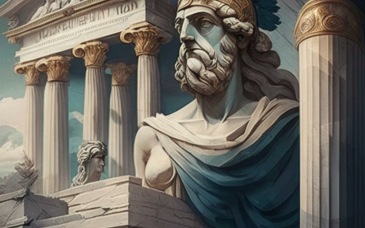If we explore the literature of Heroism, we shall quickly come to Plutarch, who is its Doctor and historian. ... I must think we are more deeply indebted to him than to all the ancient writers. Each of his "Lives" is a refutation to the despondency and cowardice of our religious and political theorists. A wild courage, a stoicism not of the schools, but of the blood, shines in every anecdote, and has given that book its immense fame.
-- Ralph Waldo Emerson, "Heroism"
I write at the close of the Twentieth Century, more than a hundred years after the above quote from the renowned American essayist, Emerson. The book that Emerson refers to, Plutarch's Parallel Lives, has now been transmitted for nineteen centuries, but its fame is no longer what it was in the Renaissance, or even in Emerson's day. I believe that at least part of the reason for Plutarch's loss of popularity is that the book is too long and the language of available English translations is too antiquated.
The Lives is a massive (over 800,000 words) collection of Greek and Roman statesmen and commanders. No matter how interesting any book this thick might be, it would daunt the resolve of most modern readers. Some smaller collections of full-text lives, grouped by historical theme, have recently been published in English, but these suffer from what most candid modern readers would consider to be defects in the full text of Plutarch, such as long, complicated sentences, tedious details, difficult allusions, and distracting digressions. So precious is Plutarch to the professional custodians of the classical tradition that every jot and tittle has been reverently preserved in currently available English translations.
I believe that it is necessary to provide a more accessible edition of the Lives, in hypertext, and to justify Plutarch as a vocabulary-building vehicle for high school students. Otherwise, no one will read him, and the world will suffer for the loss.
The Parallel Lives is arranged in pairs of lives, one Greek and one Roman, followed by a short essay of comparison. Working from the Dryden edition (1686, as revised by Clough in 1864) and the North edition (1579), I selected fifteen of the twenty-four Greek lives, abridged them to make the text easier to read, and arranged them in chronological order to make the historical flow easier to perceive. Concentrating these lives to their main points, I attempted to preserve as much as possible of what Plutarch had to say regarding the character of his subjects. Much has been omitted.
Nine of the Greek lives have been omitted from this collection. I doubt that any candid judge of character will disagree that Alcibiades, Themistocles, and Demetrius were contemptible, although they were successful, and they do not belong in the company of the heroes included. Eumenes, Aratus, Lysander, Demosthenes, and Cleomenes were relatively minor figures; and the life of Cimon -- who was undeniably a hero -- is relatively dull and duplicative of the life of Pericles. The fifteen who made the cut are not all equally heroic, but they are all interesting and instructive, and read in the order presented this collection of lives will give a reasonably complete overview of ancient Greek history.
Plutarch, an erudite Greek gentleman and a priest of the Delphic Oracle, assumes that his reader will understand his allusions and bear with his digressions. His audience was the educated class of Rome, who were already very familiar with the geography, history, and culture of Ancient Greece, and fluent in Attic Greek. But without additional research, most modern readers would have little information at hand as to where or when the events Plutarch relates happened, or who certain characters are. Therefore, notes have been supplied following the text, and these notes are accessible as you read by clicking on the raised blue numerals. Dates and other explanations are inserted in brackets in the text. The text itself has been streamlined extensively.
For students of English as a second language, or students seeking to improve their English vocabulary, I have taken pains to include as much modern American business English as possible in paraphrasing Plutarch. The vocabulary to be learned (1065 words and phrases) is in hypertext, and when you point the mouse arrow to the word and click, a brief definition will appear in the footnote window. This is more convenient than flipping the pages of a thick dictionary. Also, such a vocabulary exercise demonstrates the use of the words in context, and for memorization, what could be better than Plutarch?
I fear but accept that my work, or any revision of Plutarch at all, will be greeted with horror by those who treasure his every word, but to these critics I can only reply that (hopefully) through this work Plutarch will find more admirers. At least it is a different approach, and the let-them-eat-rocks attitude (cf. Luke 11:11) of classical scholars to undergraduates has failed to attract new readers. To those political pedants who are determined to consign Plutarch to oblivion, I have nothing to say.
Emerson assures us that "Plutarch will be perpetually rediscovered from time to time as long as books last." That is my intention and my hope. The rediscovery of this enduring classic by a new generation will, as in the Renaissance, dispel the darkness of the current age with light from ancient Greece.
Wilmot H. McCutchen
Orinda, California
September 6, 1998

